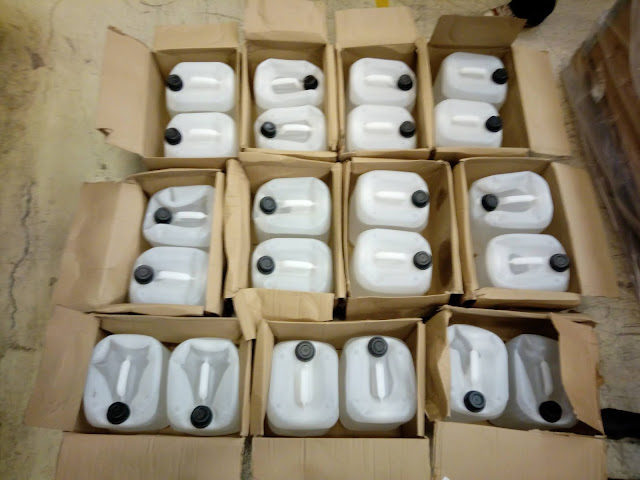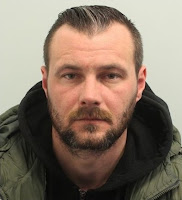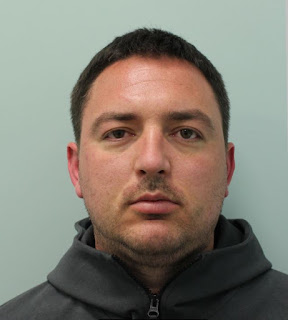Organised Crime Network jailed for drugs offences
Six people have been jailed after a specialist Met team shut down a sophisticated network of Brazilian criminals who couriered and supplied drugs across London.
During the operation, detectives recovered what is believed to be the largest quantity of GBL seized by police in the United Kingdom. More than 2,000 litres of the drug were recovered, with an estimated value of £2.2 million.
Four of the Organised Crime Network (OCN) - who were making millions of pounds from the enterprise - were sentenced on Wednesday, 24 and Thursday, 25 March at Inner London Crown Court.
The following were found guilty of 14 counts of conspiracy to supply or offer to supply Class, A, B and C drugs on 20 March 2019, after an eight-week trial at the same court. They had been remanded in custody pending sentencing:
- Henrique Bernardo Medina Salles, 27 (04.06.93), of Starboard Way, Silvertown, was sentenced to eight years’ imprisonment.
- Sullen Miguez, 36 (26.12.84), of Abbotswood Drive, St Georges Hills, Weybridge, Surrey, was sentenced to 13 years’ imprisonment.
- Carlos Eduardo Libardi Da Silva, 35 (01.10.85) of Durdham Park, Bristol was sentenced to eight years’ imprisonment.
- Diego Da Souza Arruda Reis, 35 (17.11.85), of Abbotswood Drive, St Georges Hills, Weybridge, Surrey pleaded guilty in December 2018 and was sentenced to 13 years’ imprisonment.
In addition, Dyego Melo Dos Passos, 33 (11.03.88) of Philip Lane, Tottenham, was sentenced to a total of six years and eight months’ imprisonment on 21 December 2020 at the same court. He pleaded guilty at an early hearing to 14 counts of conspiracy to supply or offer to supply Class, A, B and C drugs.
Previously, Isabella Braga Da Silva, 23 (28.02.98) was sentenced to three years and eight months’ on 16 March 2020 after being found guilty of 14 counts of conspiracy to supply or offer to supply Class, A, B and C drugs. She has since been deported to serve her sentence in Brazil.
The court heard how the network of Brazilian nationals were involved in the highly lucrative business of providing drugs to order, largely to the ‘Chemsex’ scene.
The enterprise was run along modern business lines and was, in effect, a high-tech drugs delivery service operating from a number of locations in London and for a short while in Bristol. This took place over a period of two years, from June 2016 until arrests were made on 31 July 2018.
Reis and Miguez, who were married, were partners in the operation and sat at the top of the OCN, rarely getting their hands dirty by being involved in the daily drug supply from numerous drug houses. Salles and Libardi Da Silva were their trusted lieutenants, with Salles handling the day to day running of the drug network and Libardi Da Silva managing the financial logistics - wages for drivers, spreadsheets showing sales and the cash flow.
Detectives from the Met’s Specialist Crime South team began investigating the network in March 2018 following intelligence received relating to a 'drugs phone line' being used by the group.
It was ascertained that customers would place orders for drugs ranging from GBL, methylamphetamine, cocaine, ketamine, heroin and cannabis on a dedicated drugs line number, after making their choices from a menu. Once the order had been placed, they could expect a rapid delivery by moped or motorbike courier, who would exchange an innocent looking package, often disguised as a legitimate courier delivery. The package was exchanged for cash.
The couriers would then return the money to the central management team who also took the orders and packaged up the drugs, whilst arranging the deliveries.
Detectives discovered the network supplied the drugs from temporary accommodation booked for short periods of time, generally not for longer than a week. They also had temporary offices simply called ‘A’, ‘B’ and ‘C’ which were stocked from various London based self-storage facilities used by the OCN. Suitcases were used for rapid movement of the drugs together with the necessary items to prepare them for sale.
Between January and July 2018 the OCN operated from a total of 26 different addresses across London and used five storage facilities to supply drugs to these addresses. They employed around 30 moped couriers, working six days a week. A full-time worker would earn a weekly amount of £730 and were fined by the OCN if they were late back from their deliveries.
Between 25 July and 20 August 2018, officers disrupted the operation by carrying out a series of arrests in Wandsworth and Newham.
On 25 July 2018, Braga Da Silva was arrested after £500,000 worth of drugs were found in a vehicle, along with three peli-cases which contained the contents of a mobile drug supply unit. Officers also seized £40,000 in cash and drug equipment from the vehicle including plastic wrapping and a credit card receiver to handle card transactions.
Following the arrest of Braga Da Silva, Diego Da Souza Arruda Reis fled to Spain on the same day. Officers worked with Interpol to extradite him back to the UK in December 2018, where he pleaded guilty at Inner London Crown Court.
Miguez and Libardi Da Silva were arrested shortly after on 30 July 2018. Miguez was seen leaving a self-storage unit on Ingate Place in Battersea, in possession of more than £100,000 worth of drugs. It was identified that Libardi Da Silva had dropped Miguez off at the address a short while before, and he was quickly located and apprehended in Union Street, SW8.
Salles was linked to the gang through police surveillance and was arrested on Wesley Avenue, E16, on the 20 August 2018.
Cocaine, heroin, crystal meth, GBL and cannabis worth approximately £3 million was seized following searches at five different storage facilities across London. The investigation established that the gang sold more than £2.5 million worth of drugs between 2016 and 2018.
On 20 August 2018, Salles was arrested in Newham in a white van after coming from Stansted Airport.
A total of approximately £3 million worth of cocaine, heroin, crystal meth, GBL and cannabis were seized after searches at five different storage facilities throughout London.
The investigation team realised the key to the OCN’s success was the use of technology allied to careful planning and attention to detail. WhatsApp Groups were used to arrange how the drugs would be ordered, delivered, distributed and how they would track the cash coming back to them from the orders.
The various groups had particular names which included, ‘Saidinhas’, ‘Anjos do asfalto’ (Asphalt Angels) and ‘Din Din Din’
Detective Constable Gary Smith, from the Specialist Crime Command, said: “These men and women were supplying dangerous drugs to vulnerable people who often didn’t know what they were taking. They lived a lucrative lifestyle, paying £12,500 in rent for a property in St George’s Hill in Weybridge and driving around in a flamboyant orange Lamborghini. Their lives will now dramatically change as they spend many years in prison.
“Drugs can cause significant and life altering harm, have a horrendously negative physical and mental impact on users and this gang were making huge profits whilst potentially destroying lives. We will do everything in our power to disrupt these criminals. Please keep supplying us with information either about drug dealing, or about people you feel may be exploited by drug dealers.”
Inspector Allen Davis, from the Met’s Honour, Belief and Sex (crime and Vulnerability) Partnership Team, went on to say: “The Met is committed to working in partnership through Project Sagamore to tackle the crime related risk, harm and vulnerability within the Chemsex context. The drug(s) of choice predominantly but not exclusively used in the Chemsex context are Crystal Methamphetamine, Mephedrone and GHB/GBL (G). With GBL there is also a significant risk of overdose, which can result in death.
“The effects of the drugs used also promote extreme behaviours leading to vulnerability and exploitation; the use affects memory recall and results in evidential difficulties and barriers to reporting, attracting perpetrators to the scene as a result.
“We recognise that controlled drugs used within the Chemsex context bring a number of challenges. In addition to the potential harm for the individual person who engages in sexualised substance misuse of addiction and health-risk sexual behaviours, chems can be weaponised to harm others (particularly GHB/GBL) and as in this case the supply attracts the involvement of Organised Criminal Networks.”
+ Project Sagamore is a multi-agency response to crime and vulnerability within the Chemsex context. This is jointly led by The Metropolitan Police Service (MPS) in partnership with Her Majesty’s Prison and Probation Service (London) (HMPPS), it follows from their collaboration in establishing and co-chairing the London Chemsex Working Group.
To report suspected drug crime or alert us to someone you think might be vulnerable, call 101 or Tweet @MetCC. Alternatively you can contact the independent charity Crimestoppers on 0800 555 111.




Comments
Post a Comment